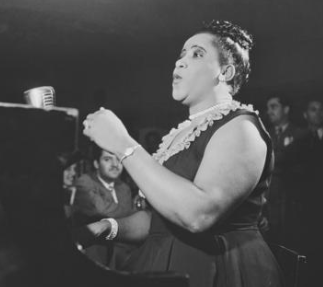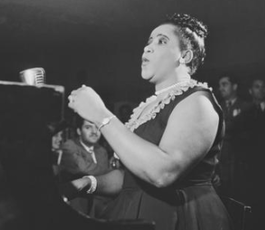Nellie Lutcher
Nellie Lutcher attained great fame in America and Europe in the late 1940s to early 1950s and is the best-known musician to emerge from Lake Charles. (Other notable Lake Charles musicians include Boozoo Chavis, Cookie and the Cupcakes, and the Hackberry Ramblers.) A versatile singer and a deft, swinging pianist, Lutcher’s eclectic repertoire seamlessly encompassed jazz and scat singing, blues, rhythm and blues, popular hits, ballads, hits from Broadway musicals, cowboy songs, comedic material, classical music, standards from the loosely defined Great American Songbook, and more. The moods of Lutcher’s music ranged from lighthearted, swinging, and, at times, mildly risqué to introspective displays of genuine, affecting emotion.
Early Life and Musical Beginnings
Born in 1912 in Lake Charles, Nellie Lutcher grew up in a large musical family. Lutcher’s father Isaac expertly played several string instruments, including the bass. Her brother Joe, a spirited saxophonist and singer, achieved coast-to-coast renown in the late 1940s to early 1950s. Another brother, Bubba, was well known around Lake Charles as an extroverted disk jockey, show promoter, bandleader, nightclub owner, and man about town.
Lutcher learned to play piano and read music from schoolteacher Eugenia King Reynaud. At age eight Lutcher first performed in public as an assistant pianist at New Sunlight Baptist Church. At age twelve she began to play with her father in Clarence Hart’s Imperial Jazz Band; around 1924 she worked as a substitute pianist accompanying renowned classic blues singer Ma Rainey, then a major national star in America’s Black community. At age fourteen Lutcher left school to become a full-time musician, performing around Texas and Louisiana with both the Imperial Jazz Band and the Southern Rhythm Band. However, the possibilities for career advancement were limited on that regional circuit, and in 1935 she moved to Los Angeles. Opportunities were significantly more likely due to the presence of a vibrant Black nightclub scene and several national-level record companies that signed Black artists.
Lutcher soon found work as a solo pianist. “I could play almost anything that was popular at the time,” she told interviewer Leslie Berman. In the clubs where Lutcher played, audiences wanted to hear her sing, too. Out of necessity, although initially resistant to the idea, Lutcher developed her vocal skills and went on to master an extensive, diverse repertoire of self-accompanied material. For the next twelve years, she struggled to stay afloat while raising her son Talmadge as a single parent.
Breakthrough Success
Lutcher’s big break came in 1947 when a producer for Capitol Records signed her after hearing her performance on a live radio show. Soon Lutcher “went on from twenty bucks a night to about three thousand dollars a week,” as she told interviewer Gus Weill. Her hits on Capitol included “Fine Brown Frame” and “Hurry on Down.” “Hurry on Down” was an assemblage of folkloric “floating verses,” also heard in many other songs in many traditional genres. On “Lake Charles Boogie” Lutcher paid tribute to her hometown.
Capitol got major airplay for Lutcher’s records on radio stations nationwide. Promoters eagerly booked her to perform at top-tier nightclubs like New York’s Café Society. In England she headlined at concert halls.
In 1950 Lutcher recorded “For You My Love” and “Can I Come In For A Second” with the suave crooner Nat “King” Cole, one of the most popular singers of that era. This heady phase of Lutcher’s career continued roughly through 1952, the year she was celebrated on the prominent national television show This Is Your Life. One highlight of that broadcast was the mayor of Lake Charles bestowing Lutcher with the keys to the city, an honor repeated in 1977. By the mid-1950s, however, Lutcher had come to sound somewhat dated compared to subsequent new musical developments. Work slowed down and, to supplement her income, Lutcher invested in real estate. In 1968 the Musicians’ Union Local 47 elected Lutcher to its board of directors, making her the first African American to become a board member.
Later Years and Legacy
Lutcher’s later years were brightened by renewed recognition. In 1993 Lutcher performed at the New Orleans Jazz & Heritage Festival. In the mid-1990s she again played prestigious venues such as Michael’s Pub in New York and the Cinegrill Theater at the Hollywood Roosevelt Hotel. In 1996 the German record label Bear Family released a four-CD reissue boxed set of Lutcher’s music.
Lutcher died in 2007, but her memory lives on. That same year Lake Charles’s Itinerant Theatre debuted playwright Carolyn Woosley’s one-woman show Nellie, based on Lutcher’s life, as part of Woosley’s thirteen-play cycle Louisiana Women. Several subsequent productions of Nellie followed over the years, including a run in 2010 in six Louisiana cities along with two other plays by Woosley; the role of Lutcher was played alternately by actresses Neverlyn Townsel and Wilma Moore Young. In 2019 the City of Lake Charles created the Nellie Lutcher Memorial Cultural District and Nellie Lutcher Memorial Park as part of a project to revitalize the Enterprise Boulevard neighborhood. In 2023 Lake Charles’s Imperial Calcasieu Museum and the Old City Hall Arts & Cultural Center co-curated the exhibit Nellie Lutcher: Delightfully Yours.
Suggested Reading
Brockman, Sally. “Nellie Lutcher: From Obscurity to Rhythm and Blues Sensation.” Visit Lake Charles: Louisiana’s Playground, October 15, 2019. https://www.visitlakecharles.org/blog/post/about-nellie-lutcher/
“Louisiana Legends; Nellie Lutcher,” 1983-04-01, Louisiana Public Broadcasting, American Archive of Public Broadcasting (GBH and the Library of Congress), Boston, MA and Washington, DC. http://americanarchive.org/catalog/cpb-aacip-17-72p5jsgz
McLeod-Porter, Delma. “‘Hurry on Down’: The Musical Career of Nellie Lutcher.” 64 Parishes, Spring 2009. https://64parishes.org/nellie-lutcher
Content provided by 64 Parishes, a project of the Louisiana Endowment for the Humanities.


